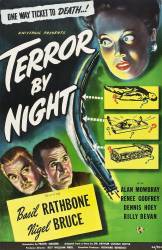Sherlock Holmes: The young lady is taking her mother to Scotland for burial.
Inspector Lestrade: In a coffin?
Sherlock Holmes: That is the customary method, I believe.

Terror by Night (1946)
Directed by: Roy William Neill
Starring: Basil Rathbone, Nigel Bruce, Alan Mowbray
Lady Margaret Carstairs: I shall report you both to Scotland Yard.
Inspector Lestrade: ...But I am Scotland Yard.
Sherlock Holmes: Thank you, Lady Margaret. We'll be as unobtrusive as possible.
Lady Margaret Carstairs: That would be a novelty from a policeman.
Question: Holmes says he realised that Inspector McDonald was an impostor because he supposedly knows the 'real' Inspector McDonald of the Edinburgh police. As shown in the other movies and Conan Doyle's original stories, there are several Inspectors working for Scotland Yard in London (another British city), which begs the question: does this resolution Holmes mentioned about two British Inspectors having the same surname make sense and, if so, why?
Join the mailing list
Separate from membership, this is to get updates about mistakes in recent releases. Addresses are not passed on to any third party, and are used solely for direct communication from this site. You can unsubscribe at any time.
Check out the mistake & trivia books, on Kindle and in paperback.




Answer: If you're comparing the film to Arthur Conan Doyle's original Sherlock Holmes stories, then any discrepancy does not really apply. The Basil Rathbone films were loose adaptions of Doyle's work, often incorporating plot elements from multiple stories or were original screenplays with new characters. There was little regard to details or plot consistencies. "Terror by Night" was an entirely original story. The original Sherlock Holmes stories were set in the late Victorian era while the 12 Universal Studio films mostly took place during World War II, with Holmes often fighting Nazis and enemy spies. The first two Sherlock Holmes films by 20th Cent. Fox studio were generally faithful to the original stories.
raywest ★
Actually, my question is related to the movies themselves and it's not a comparison. There are still several inspectors working for Scotland Yard in the Basil Rathbone saga too (I've made an entry edition to include this).
Big Game
Thanks for clarifying, though you stated, "as shown in the other movies 'and' Doyle's original stories." Much of my previous answer still applies. The Basil Rathbone movies were not a definitive interpretation of Sherlock Holmes. The first two by 20th Century Fox were mostly faithful to the original stories. The 12 later Universal Studios films were lower-budget, cranked out in rapid succession for profit, and shifted the time period to the mid-20th century for cheaper production costs. The studio's mandate was the films were, "to simply be entertaining B pictures." There was little regard for historical accuracy or plot continuity from film to film. Scripts were simultaneously developed by different writing teams. The 12 films had multiple directors and screenwriters who were focused on their individual projects.
raywest ★
Actually, almost all the movies were directed by Roy William Neill (11 of 14).
Big Game
That's true, but many different screenwriters were simultaneously working on the various movies. It's also typical in Hollywood for uncredited "script doctors" to revise scripts, further adding to small inconsistencies. Universal Studios had a seven-year contract with the Doyle estate to make the Sherlock Holmes films. They produced them quickly, releasing three movies per year. Under the contract, Universal was allowed to make plot revisions, create some original stories, and modernise the setting (making it more topical and cheaper to produce).
raywest ★